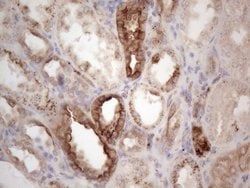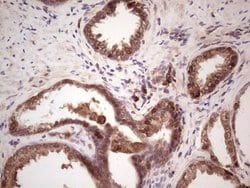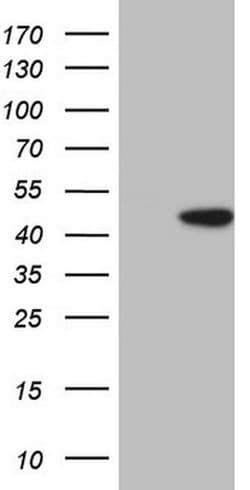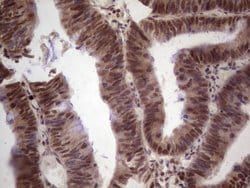PIMA526779
LPIN1 Monoclonal Antibody (OTI7F5), Invitrogen™
Manufacturer: Thermo Scientific
Select a Size
| Pack Size | SKU | Availability | Price |
|---|---|---|---|
| Each of 1 | PIMA526779-Each-of-1 | In Stock | ₹ 52,198.50 |
PIMA526779 - Each of 1
In Stock
Quantity
1
Base Price: ₹ 52,198.50
GST (18%): ₹ 9,395.73
Total Price: ₹ 61,594.23
Antigen
LPIN1
Classification
Monoclonal
Concentration
1 mg/mL
Formulation
PBS with 1% BSA, 50% glycerol and 0.02% sodium azide; pH 7.3
Gene Accession No.
Q14693
Gene Symbols
LPIN1
Immunogen
Full length human recombinant protein of LPIN1 produced in HEK293T cell
Quantity
100μL
Primary or Secondary
Primary
Target Species
Human
Product Type
Antibody
Isotype
IgG2a
Applications
Immunohistochemistry (Paraffin), Western Blot
Clone
OTI7F5
Conjugate
Unconjugated
Gene
LPIN1
Gene Alias
4631420P06; DKFZp781P1796; Fatty liver dystrophy protein; Fld; KIAA0188; lipin 1; Lipin1; lipin-1; LPIN1; mKIAA0188; PAP1; Phosphatidate phosphatase LPIN1
Host Species
Mouse
Purification Method
Affinity Chromatography
Regulatory Status
RUO
Gene ID (Entrez)
23175
Content And Storage
-20° C, Avoid Freeze/Thaw Cycles
Form
Liquid
Description
- The Lipin family of nuclear proteins contains three members: Lipin-1, Lipin-2 and Lipin-3, all of which contain a nuclear signal sequence, a highly conserved amino-terminal (NLIP) domain and a carboxy-terminal (CLIP) domain
- LPIN1 (Lipin-1) is crucial for normal adipose tissue development and metabolism
- LPIN1 selectively activates a subset of PGC-1A; target pathways, including fatty acid oxidation and mitochondrial oxidative phosphorylation by inducing expression of the nuclear receptor PPARA
- LPIN1 also inactivates the lipogenic program and suppresses circulating lipid levels
- An abundance of LPIN1 promotes fat accumulation and insulin sensitivity, whereas a deficiency in LPIN1 may deter normal adipose tissue development, resulting in insulin resistance and lipodystrophy, a heterogeneous group of disorders characterized by loss of body fat, fatty liver, hypertriglyceridemia and insulin resistance.
Compare Similar Items
Show Difference
Antigen: LPIN1
Classification: Monoclonal
Concentration: 1 mg/mL
Formulation: PBS with 1% BSA, 50% glycerol and 0.02% sodium azide; pH 7.3
Gene Accession No.: Q14693
Gene Symbols: LPIN1
Immunogen: Full length human recombinant protein of LPIN1 produced in HEK293T cell
Quantity: 100μL
Primary or Secondary: Primary
Target Species: Human
Product Type: Antibody
Isotype: IgG2a
Applications: Immunohistochemistry (Paraffin), Western Blot
Clone: OTI7F5
Conjugate: Unconjugated
Gene: LPIN1
Gene Alias: 4631420P06; DKFZp781P1796; Fatty liver dystrophy protein; Fld; KIAA0188; lipin 1; Lipin1; lipin-1; LPIN1; mKIAA0188; PAP1; Phosphatidate phosphatase LPIN1
Host Species: Mouse
Purification Method: Affinity Chromatography
Regulatory Status: RUO
Gene ID (Entrez): 23175
Content And Storage: -20° C, Avoid Freeze/Thaw Cycles
Form: Liquid
Antigen:
LPIN1
Classification:
Monoclonal
Concentration:
1 mg/mL
Formulation:
PBS with 1% BSA, 50% glycerol and 0.02% sodium azide; pH 7.3
Gene Accession No.:
Q14693
Gene Symbols:
LPIN1
Immunogen:
Full length human recombinant protein of LPIN1 produced in HEK293T cell
Quantity:
100μL
Primary or Secondary:
Primary
Target Species:
Human
Product Type:
Antibody
Isotype:
IgG2a
Applications:
Immunohistochemistry (Paraffin), Western Blot
Clone:
OTI7F5
Conjugate:
Unconjugated
Gene:
LPIN1
Gene Alias:
4631420P06; DKFZp781P1796; Fatty liver dystrophy protein; Fld; KIAA0188; lipin 1; Lipin1; lipin-1; LPIN1; mKIAA0188; PAP1; Phosphatidate phosphatase LPIN1
Host Species:
Mouse
Purification Method:
Affinity Chromatography
Regulatory Status:
RUO
Gene ID (Entrez):
23175
Content And Storage:
-20° C, Avoid Freeze/Thaw Cycles
Form:
Liquid
Antigen: Angiopoietin 2
Classification: Monoclonal
Concentration: 1 mg/mL
Formulation: PBS with 1% BSA, 50% glycerol and 0.02% sodium azide; pH 7.3
Gene Accession No.: O15123
Gene Symbols: ANGPT2
Immunogen: Human recombinant protein fragment corresponding to amino acids 19-496 of ANGPT2 produced in E.coli
Quantity: 100μL
Primary or Secondary: Primary
Target Species: Human
Product Type: Antibody
Isotype: IgG1
Applications: Immunohistochemistry (Paraffin), Western Blot
Clone: OTI3H7
Conjugate: Unconjugated
Gene: ANGPT2
Gene Alias: AGPT2; Ang2; Ang-2; angiopoietin 2; angiopoietin-2; angiopoietin-2a; angiopoietin-2B; ANGPT2; endothelial growth factor; Tie2-ligand
Host Species: Mouse
Purification Method: Affinity Chromatography
Regulatory Status: RUO
Gene ID (Entrez): 285
Content And Storage: -20° C, Avoid Freeze/Thaw Cycles
Form: Liquid
Antigen:
Angiopoietin 2
Classification:
Monoclonal
Concentration:
1 mg/mL
Formulation:
PBS with 1% BSA, 50% glycerol and 0.02% sodium azide; pH 7.3
Gene Accession No.:
O15123
Gene Symbols:
ANGPT2
Immunogen:
Human recombinant protein fragment corresponding to amino acids 19-496 of ANGPT2 produced in E.coli
Quantity:
100μL
Primary or Secondary:
Primary
Target Species:
Human
Product Type:
Antibody
Isotype:
IgG1
Applications:
Immunohistochemistry (Paraffin), Western Blot
Clone:
OTI3H7
Conjugate:
Unconjugated
Gene:
ANGPT2
Gene Alias:
AGPT2; Ang2; Ang-2; angiopoietin 2; angiopoietin-2; angiopoietin-2a; angiopoietin-2B; ANGPT2; endothelial growth factor; Tie2-ligand
Host Species:
Mouse
Purification Method:
Affinity Chromatography
Regulatory Status:
RUO
Gene ID (Entrez):
285
Content And Storage:
-20° C, Avoid Freeze/Thaw Cycles
Form:
Liquid
Antigen: PCBP1
Classification: Monoclonal
Concentration: 1 mg/mL
Formulation: PBS with 1% BSA, 50% glycerol and 0.02% sodium azide; pH 7.3
Gene Accession No.: Q15365
Gene Symbols: PCBP1
Immunogen: Human recombinant protein fragment corresponding to amino acids 1-225 of PCBP1 produced in E.coli
Quantity: 100μL
Primary or Secondary: Primary
Target Species: Human
Product Type: Antibody
Isotype: IgG2b
Applications: Immunohistochemistry (Paraffin), Western Blot
Clone: OTI3B9
Conjugate: Unconjugated
Gene: PCBP1
Gene Alias: [a]CP-1; Alpha-CP1; alphaCP-1; epididymis secretory protein Li 85; HEL-S-85; Heterogeneous nuclear ribonucleoprotein E1; heterogenous nuclear ribonucleoprotein E1; heterogenous nuclear ribonucleoprotein X; hnRNP E1; hnRNP-E1; hnRNP-E1 protein; hnRNP-X; HNRPE1; HNRPX; Nucleic acid-binding protein SUB2.3; PCBP1; poly(rC) binding protein 1; poly(rC)-binding protein 1; RGD1561319; WBP17
Host Species: Mouse
Purification Method: Affinity Chromatography
Regulatory Status: RUO
Gene ID (Entrez): 5093
Content And Storage: -20° C, Avoid Freeze/Thaw Cycles
Form: Liquid
Antigen:
PCBP1
Classification:
Monoclonal
Concentration:
1 mg/mL
Formulation:
PBS with 1% BSA, 50% glycerol and 0.02% sodium azide; pH 7.3
Gene Accession No.:
Q15365
Gene Symbols:
PCBP1
Immunogen:
Human recombinant protein fragment corresponding to amino acids 1-225 of PCBP1 produced in E.coli
Quantity:
100μL
Primary or Secondary:
Primary
Target Species:
Human
Product Type:
Antibody
Isotype:
IgG2b
Applications:
Immunohistochemistry (Paraffin), Western Blot
Clone:
OTI3B9
Conjugate:
Unconjugated
Gene:
PCBP1
Gene Alias:
[a]CP-1; Alpha-CP1; alphaCP-1; epididymis secretory protein Li 85; HEL-S-85; Heterogeneous nuclear ribonucleoprotein E1; heterogenous nuclear ribonucleoprotein E1; heterogenous nuclear ribonucleoprotein X; hnRNP E1; hnRNP-E1; hnRNP-E1 protein; hnRNP-X; HNRPE1; HNRPX; Nucleic acid-binding protein SUB2.3; PCBP1; poly(rC) binding protein 1; poly(rC)-binding protein 1; RGD1561319; WBP17
Host Species:
Mouse
Purification Method:
Affinity Chromatography
Regulatory Status:
RUO
Gene ID (Entrez):
5093
Content And Storage:
-20° C, Avoid Freeze/Thaw Cycles
Form:
Liquid
Antigen: GLI4
Classification: Monoclonal
Concentration: 1 mg/mL
Formulation: PBS with 1% BSA, 50% glycerol and 0.02% sodium azide; pH 7.3
Gene Accession No.: P10075
Gene Symbols: Gli4
Immunogen: Full length human recombinant protein of GLI4 produced in E.coli
Quantity: 100μL
Primary or Secondary: Primary
Target Species: Human
Product Type: Antibody
Isotype: IgG2b
Applications: Immunohistochemistry (Paraffin), Western Blot
Clone: OTI3A9
Conjugate: Unconjugated
Gene: Gli4
Gene Alias: 9130023H24Rik; GLI family zinc finger 4; GLI4; GLI-Kruppel family member GLI4; GLI-Kruppel family member GLI4 (oncogene HKR4); glioma-associated oncogene family zinc finger 4; HKR4; Krueppel-related zinc finger protein 4; Protein HKR4; RIKEN cDNA 9130023H24 gene; zinc finger protein GLI4; ZNF928
Host Species: Mouse
Purification Method: Affinity Chromatography
Regulatory Status: RUO
Gene ID (Entrez): 2738
Content And Storage: -20° C, Avoid Freeze/Thaw Cycles
Form: Liquid
Antigen:
GLI4
Classification:
Monoclonal
Concentration:
1 mg/mL
Formulation:
PBS with 1% BSA, 50% glycerol and 0.02% sodium azide; pH 7.3
Gene Accession No.:
P10075
Gene Symbols:
Gli4
Immunogen:
Full length human recombinant protein of GLI4 produced in E.coli
Quantity:
100μL
Primary or Secondary:
Primary
Target Species:
Human
Product Type:
Antibody
Isotype:
IgG2b
Applications:
Immunohistochemistry (Paraffin), Western Blot
Clone:
OTI3A9
Conjugate:
Unconjugated
Gene:
Gli4
Gene Alias:
9130023H24Rik; GLI family zinc finger 4; GLI4; GLI-Kruppel family member GLI4; GLI-Kruppel family member GLI4 (oncogene HKR4); glioma-associated oncogene family zinc finger 4; HKR4; Krueppel-related zinc finger protein 4; Protein HKR4; RIKEN cDNA 9130023H24 gene; zinc finger protein GLI4; ZNF928
Host Species:
Mouse
Purification Method:
Affinity Chromatography
Regulatory Status:
RUO
Gene ID (Entrez):
2738
Content And Storage:
-20° C, Avoid Freeze/Thaw Cycles
Form:
Liquid



